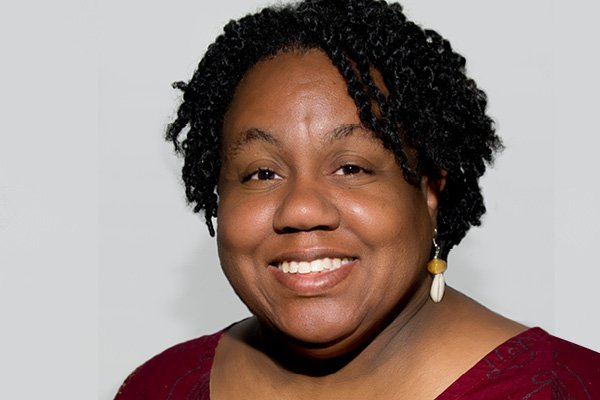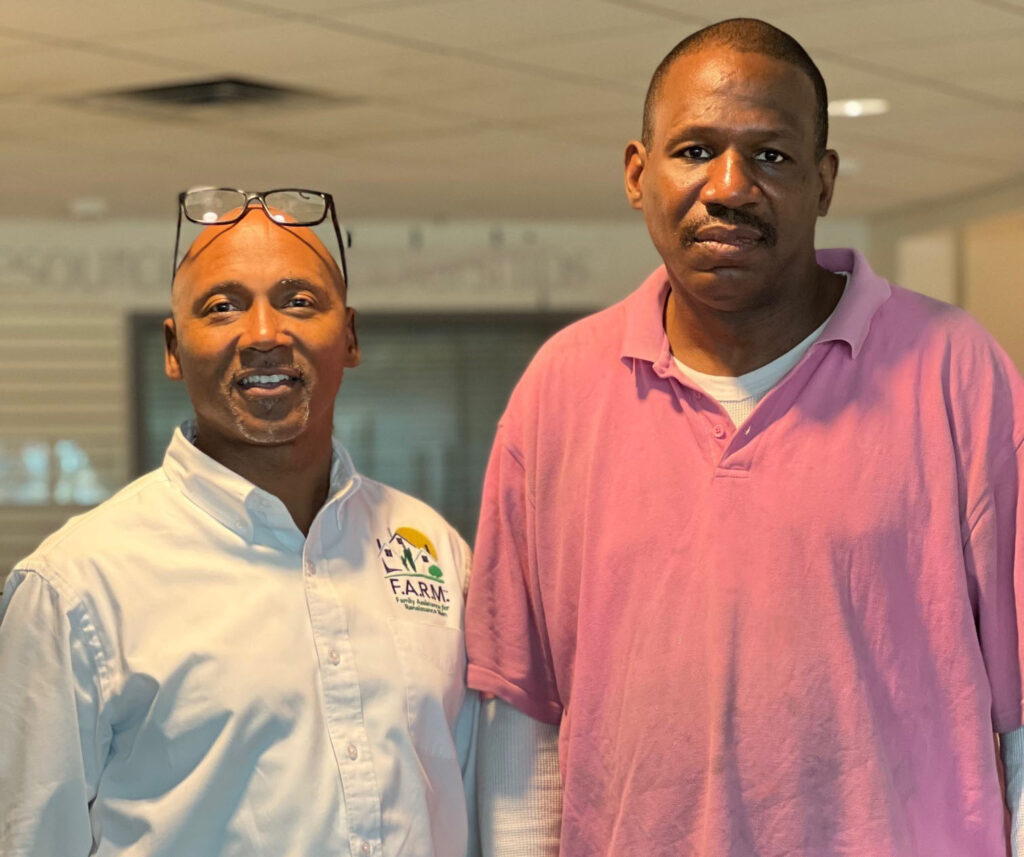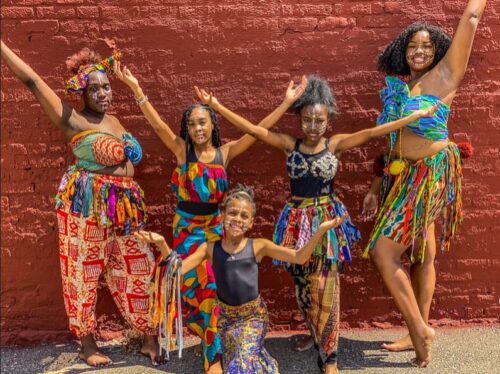![]() Click here for an audio version of this story.
Click here for an audio version of this story.
When PHILADANCO! performers took the stage at Detroit School of Arts, it was more than a performance.
It was a call to action.
The troop performed “Endangered Species,” a movement work by famed choreographer Anthony Burrell, as a part of Heritage Works‘ Youth Day. The piece explores police brutality, community loss and opportunities for transformation – themes that feel particularly piercing and relevant given the recent death of Tyre Nichols at the hands of Memphis police.
Heritage Works is a Detroit-based community organization that promotes youth and community development through cultural traditions, arts and education. The organization’s Youth Day, which also included artist talkbacks and movement-based workshops for more than 400 students from eight Detroit public schools, was made possible, in part, by a grant from United Way for Southeastern Michigan’s Racial Equity Fund (REF).
Since the first round of funding in 2021, the REF has distributed $2 million in grants to 49 Black, Indigenous, and people of color (BIPOC)-led organizations in Macomb, Oakland, Washtenaw and Wayne counties.

“The majority of children in Detroit are of African descent and so they need things that are culturally relevant to them. Cultural dance is welcoming. It creates space for people of African descent to feel good about themselves and to embrace their bodies instead of assimilating to Western norms.” — Rhonda Greene, founder, Heritage Works
CREATING SPACE
Equity was at the heart of Rhonda Greene’s mission when she founded Heritage Works more than 20 years ago.
“Just to get our work supported and foregrounded are exercises in equity. It’s now part of our DNA,” Rhonda said.
In the beginning, the organization focused on dance to preserve and showcase African heritage. Over time, the scope of cultural programming has broadened, but remains rooted in the traditions of Africa and the Diaspora.
“The majority of children in Detroit are of African descent and so they need things that are culturally relevant to them,” Rhonda said. “Cultural dance is welcoming. It creates space for people of African descent to feel good about themselves and to embrace their bodies instead of assimilating to Western norms.”
Heritage Works offers critical support for children including in-school and out-of-school programming. Unfortunately, most arts funding supports Western European-focused arts organizations– opera companies, ballet companies, art museums with multimillion dollar budgets. Structural challenges (e.g., Eurocentric quality standards) have made it difficult to secure funding over the years, according to Rhonda, who serves as the organization’s executive director.
A study by the Helicon Collaborative found that organizations focused on communities of color make up 25 percent of all arts nonprofits but receive just 4 percent of all foundation giving. The study notes that these funding disparities are out of sync with a nation in which 37 percent of the population are people of color and 50 percent are low-income.
DEEPER THAN ART
Individual REF grants range from $10,000 to $50,000. The grants are flexible, unrestricted and support organizations that are often excluded from the traditional funding ecosystem.
“Access to dollars means everything,” Rhonda said, speaking to the importance of the organization’s Youth Works programming that is supported by the REF grant.
“People are slowly waking up to the important role culturally-specific AALANA (African American, Latinx, Asian and Native American) organizations play in addressing disparities.
REF support is ahead of the curve, making the connection between cultural work and equity.
“To do work that supports BIPOC youth was considered anti-American for a long time. Who we were and what we did got in the way of our support and in turn, the work.
“People didn’t understand the need for African American youth to feel centered in their narratives and thought that Western history should share the spotlight. I think people are coming to understand that more – empowerment of Black youth is not hatred towards white youth or any other group.”
CENTERED IN COMMUNITY
The Racial Equity Fund was designed by a diverse and inclusive workgroup of community members during the summer and fall of 2021. The workgroup was informed by the Centering Community Voice Blueprint, developed in collaboration with Detroit Future City. This blueprint proactively incorporates lived experience of people they serve into United Way’s grantmaking process.
United Way for Southeastern Michigan’s Diversity, Equity, and Inclusion (DEI) team chose members of the original workgroup from a diverse collection of local organizations and leaders with close ties to the community. The workgroup made the nine-week commitment to developing the framework for the fund, as well as the original grantee selection process.
“Our central goal is to create with community equitable opportunities for BIPOC leaders and organizations that are in closest proximity to the expressed inequities and empower them with the resources and support necessary to make sustainable change in the lives of residents in our region,” said Andre Ebron, senior director, Diversity, Equity, and Inclusion at United Way for Southeastern Michigan.
In addition to funding, REF recipients receive access to tools, resources, and meet one-on-one with United Way’s DEI team to discuss their programs and work to eliminate any potential barriers to success.
“It is vitally important to support sustainability and leadership development for organizations who have faced barriers to their ability to impact our communities,” said Tonya Adair, Chief People, Equity, and Inclusion Officer, United Way for Southeastern Michigan.
REF programs from the first 23 grant recipients are on track to serve nearly 37,000 individuals by May.

“I see how important this is to fathers and how important fathers are to families. The stats don’t lie – 85 percent of children with behavioral disorders come from fatherless homes, 90 percent of homeless and runaway children come from fatherless homes and 71 percent of college dropouts come from fatherless homes.” — Willie Bell, FARM founder and CEO
REWRITING NARRATIVES
One of those individuals, Donald Payne, who was helped by Family Assistance for Renaissance Men (FARM), said the impact of the Racial Equity Fund has been life-affirming.
FARM provides a range of programs to improve the lives of Black fathers and their children. From mentoring to housing to education and training, the organization is rewriting the narrative on Black fatherhood.
“I’m 53,” Donald said. “Even at that age, this program has made me want to learn, improve and just be a better person.”
“They’re helping me get my license back.
“I’ve done drywall and paint for a long time. They’re helping me learn more about that and get my business set up the right way.”
With REF dollars, FARM has provided stipends to the men who attend their 10-week Father Accountability Mentoring program. A portion of the stipends can be used to pay child support arrears or overcome other barriers including tickets, license restrictions and school debt. Grant funds also provide legal assistance to fathers who want to reunite with or make a difference in their children’s lives.
“I see how important this is to fathers and how important fathers are to families,” said Willie Bell, FARM founder and CEO. “The stats don’t lie – 85 percent of children with behavioral disorders come from fatherless homes, 90 percent of homeless and runaway children come from fatherless homes and 71 percent of college dropouts come from fatherless homes.”
But it’s more than numbers. Willie’s commitment is rooted in his own experiences.
“My father lived in Detroit – where I grew up. He never visited me a day in my life,” Willie said. “By 25, I had three children by three different women and no clue how to be a father.”
STRENGTHENING THE FOUNDATION
Since its inception in 2015, FARM has assisted more than 300 men. Each of those men positively impacts the lives of 3.5 children and 2.5 women on average, according to data from FARM.
“The reason I put all these programs together is because I didn’t have access to any of them coming up,” Willie said. “Because I took the hard route, I’m able to share knowledge and make sure others don’t perish due to a lack of knowledge.”
“It’s about developing leaders — developing you into the leader that you desire to be rather than the man that you became.”
BOLD MOVES
The 2023 REF cohort includes 26 organizations like the Detroit Black Farmer Fund and the Macomb County Ministerial Alliance that are tackling historical inequities, as well as groups like the Black Male Educators Alliance and CODE313 that are preparing youth for a better, more inclusive future.
“The success of the first cohort of the Racial Equity Fund inspired our continued support of this important work,” Tonya said. “Thanks to sponsors, supporters, and proactive members of the community, we can extend this impact and continue to close the gap of historic inequities.”
Heritage Works is excited to have United Way leading the charge locally toward equity in grantmaking.
“We’re so appreciative of United Way,” Rhonda said. “It’s courageous to step up and back organizations like ours. They’re being bold in their initiatives and efforts and that’s what’s required to make space – to bolster change.”
Racial Equity Fund 2023 Cohort
- Autism Support Services Center
- Bailey Park Neighborhood Development Corporation
- Black Male Educators Alliance
- CODE313
- Detroit Black Farmer Land Fund
- Detroit College Access Network
- Detroit Hives
- Detroit Impact, Inc
- Developing Despite Distance
- Dream of Detroit
- Ebenezer Community and Cultural Center
- Grandmont Rosedale Development Corporation
- HCB Human Care
- Macomb County Ministerial Alliance Inc
- New E.R.A. Community Group, Inc.
- NPower Michigan
- Oakland Forward
- Second Ebenezer
- Sound Mind Sound Body
- Southeast Michigan IBCLCs of Color
- T.E.A. (Teach Empower Achieve)
- The NOAH Project
- The Yunion, Inc.
- Tri-Unity Community Development Corporation
- Vision Unfold
- Zaman International
To learn more about the Racial Equity Fund and make a donation, click the button below.
